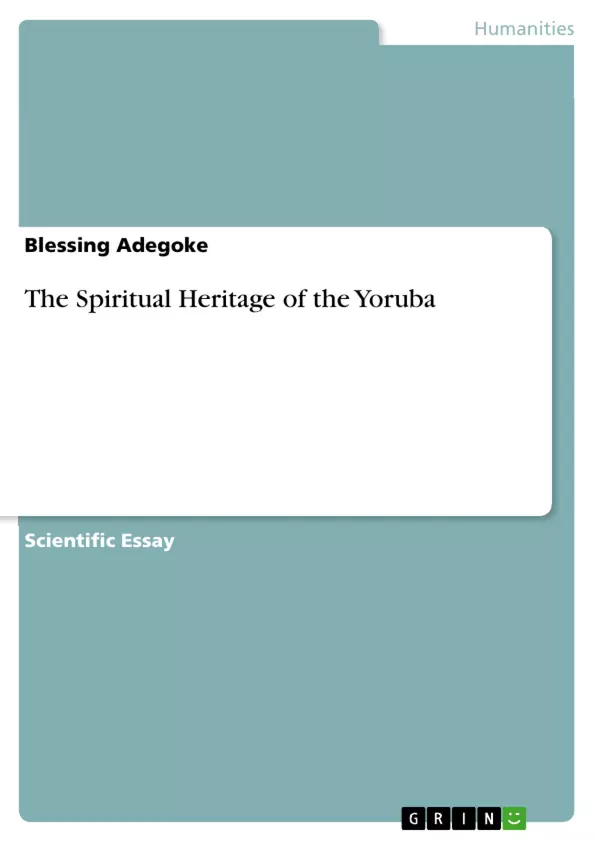It is certain that specialists on the Yoruba religion presented various models of Yoruba religion. The researcher will only cite the following scholars who are authorities on Yoruba religion. Johnson (1921), Peel (1968), Lucas (1948),Fadipe(1970),Idowu(1962), Shorter(1975) and Awolalu (1979)were the early authorities in Yoruba religion. Some recent writers on Yoruba religion are also used in this work. They include Adewale (1988), Oduyoye (2008), Omoleye(2005), Oborji (2005), Olurode and Olusanya(2010) and Etuk (2002). These authors are used because of their major contributions to the Yoruba religion, critical analysis of their work and their relevance to this study. The authors are also cited to support or to compare the researcher’s argument on Yoruba religion as means of linking the spiritual and physical worlds; and to link the Yoruba societal behavior to the spirit word.
Table of Contents
- Introduction
- Debate on Olodumare
- God-Olodumare
Objectives and Key Themes
This work aims to analyze the Yoruba understanding of their spiritual heritage, focusing on their conception of the Supreme Being, Olodumare, and the complexities surrounding monotheistic interpretations of their religious practices. It examines differing scholarly perspectives on the nature of Yoruba religion, comparing "devout" and "de-Hellenist" interpretations.
- The nature of Olodumare, the Yoruba Supreme Being.
- The debate surrounding the monotheistic or polytheistic nature of Yoruba religion.
- The influence of Western theological interpretations on understanding Yoruba spirituality.
- Anthropomorphic expressions used to describe Olodumare's attributes.
- The role of divinities (orisa) within the Yoruba spiritual framework.
Chapter Summaries
Introduction: This introductory chapter lays the groundwork for the study by establishing the key scholars and their contributions to the understanding of Yoruba religion. It highlights the pragmatic nature of Yoruba worship, often focused on material needs (wealth, children, peace), and introduces the complexities of interpreting Yoruba religion as monotheistic, polytheistic, or pantheistic due to the presence of a Supreme Being alongside numerous divinities and spirits. The chapter sets the stage for exploring the debate surrounding the nature of Olodumare and the interpretation of Yoruba religious practices within a broader context of African traditional religions.
Debate on Olodumare: This chapter delves into a significant scholarly debate concerning the interpretation of the Yoruba belief in Olodumare, the Supreme Being. It contrasts the perspectives of "devout scholars," who emphasize the authenticity of Yoruba monotheism, with "de-Hellenist scholars," who argue that the concept of a transcendent, omnipotent God is a result of Christian influence. The chapter particularly analyzes Idowu's concept of "diffused monotheism" and Lucas's argument for a monotheistic element influenced by higher civilizations. The author ultimately sides with the de-Hellenist view, emphasizing the Yoruba focus on physical objects over abstract metaphysical concepts.
God-Olodumare: This chapter focuses on the attributes of Olodumare, the Yoruba Supreme Being. It explores the etymological meaning of the name "Olodumare," connecting it to concepts of glory, splendor, and vastness. The chapter contrasts the abstract concept of God with the Yoruba’s anthropomorphic expressions, suggesting that an understanding of Olodumare is best achieved through examining these earthly representations rather than imposing Western theological frameworks. It highlights the use of anthropomorphic language—similar to the Old Testament—to describe Olodumare’s characteristics, demonstrating a distinct and unique approach to the understanding of the divine.
Keywords
Yoruba religion, Olodumare, Orisa, Monotheism, Polytheism, Pantheism, African traditional religion, Anthropomorphism, Devout scholars, De-Hellenist scholars, Spiritual heritage, Supreme Being, Divinities, Spirits, Ancestors.
Frequently Asked Questions: A Comprehensive Language Preview
What is the overall focus of this academic preview?
This preview provides a structured overview of an academic work analyzing the Yoruba understanding of their spiritual heritage, specifically focusing on their conception of the Supreme Being, Olodumare, and the complexities surrounding monotheistic interpretations of their religious practices. It examines differing scholarly perspectives, comparing "devout" and "de-Hellenist" interpretations.
What topics are covered in the Table of Contents?
The Table of Contents includes: Introduction, Debate on Olodumare, and God-Olodumare.
What are the key objectives and themes explored in this work?
The key themes revolve around the nature of Olodumare, the debate regarding the monotheistic or polytheistic nature of Yoruba religion, the influence of Western theological interpretations, anthropomorphic expressions used to describe Olodumare, and the role of divinities (orisa) within the Yoruba spiritual framework.
What is discussed in the "Introduction" chapter?
The introduction establishes key scholars and their contributions to understanding Yoruba religion. It highlights the pragmatic nature of Yoruba worship and introduces the complexities of interpreting Yoruba religion as monotheistic, polytheistic, or pantheistic due to the presence of a Supreme Being and numerous divinities and spirits. It sets the stage for exploring the debate surrounding Olodumare and interpretations of Yoruba religious practices.
What is the central argument of the "Debate on Olodumare" chapter?
This chapter delves into the scholarly debate on interpreting Yoruba belief in Olodumare. It contrasts "devout scholars," who emphasize Yoruba monotheism, with "de-Hellenist scholars," who argue the concept of a transcendent God is a result of Christian influence. It analyzes Idowu's "diffused monotheism" and Lucas's argument for a monotheistic element influenced by higher civilizations. The author leans towards the de-Hellenist view, highlighting the Yoruba focus on physical objects over abstract metaphysical concepts.
What is the main focus of the "God-Olodumare" chapter?
This chapter focuses on the attributes of Olodumare. It explores the etymological meaning of the name and connects it to concepts of glory and vastness. It contrasts the abstract concept of God with the Yoruba’s anthropomorphic expressions, suggesting that understanding Olodumare is best achieved through earthly representations rather than Western theological frameworks. It highlights the use of anthropomorphic language to describe Olodumare’s characteristics.
What keywords are associated with this academic work?
Keywords include: Yoruba religion, Olodumare, Orisa, Monotheism, Polytheism, Pantheism, African traditional religion, Anthropomorphism, Devout scholars, De-Hellenist scholars, Spiritual heritage, Supreme Being, Divinities, Spirits, and Ancestors.
- Quote paper
- Blessing Adegoke (Author), 2010, The Spiritual Heritage of the Yoruba, Munich, GRIN Verlag, https://www.grin.com/document/195980



